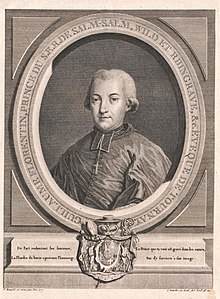Wilhelm Florentin of Salm-Salm
Wilhelm Florentin von Salm-Salm (born May 10, 1745 at Anholt Castle , † September 14, 1810 in Hahnbach , Upper Palatinate ) was Bishop of Tournai and Archbishop of Prague .
Life
The 18th child of the Austrian field marshal and governor of Antwerp , Nikolaus Leopold zu Salm-Salm , was destined for a military career and attended the college in Juilly ( France ) and the Theresian Academy in Vienna . Since he later wanted to pursue a spiritual career, he then studied theology and law in Cologne and Liège . In 1761 he became canon in Cologne, Strasbourg and Liège. In 1765 he was able to obtain another cathedral canonical in Augsburg.
He was ordained a priest on March 17, 1771 . The cathedral chapter of Tournai asked Maria Theresa after the death of the bishop who was related to him to propose him as Bishop of Tournai in 1770. However, the Empress did not nominate him until January 30, 1776 and the Pope made the appointment on May 20, 1776. The Archbishop of Cologne, Maximilian Friedrich von Königsegg-Rothenfels , donated him the episcopal ordination on July 14, 1776 in Bonn Minster .
As a bishop who loved pomp, he also valued liturgical splendor. He urged good religious instruction of the people and was at the same time benevolent. From 1773 to 1788 he was regent of the imperial immediate family estates for his underage nephew and in 1788 he supported the Josephine general seminary in Leuven .
Since part of the Diocese of Tournai belonged to France, he was directly affected by the French Revolution and took part in the Estates General in Versailles on May 5, 1789 . When the Brabant portion of the diocesan clergy to the rebellious, located in the French share of diocesan priests joined the bishop left in 1791 in solidarity with Emperor Joseph II. His diocese and went to Cologne. There he continued to rule his diocese, he tried to calm his diocesans and strengthen loyalty to the imperial family. After a brief return, he fled the French troops in 1792, first to Anholt and then to Cologne.
In order to get Maximilian Franz of Austria to vote, in 1780 he was promised Gran, the richest archbishopric of the monarchy. In the meantime, however, the Archdiocese of Prague became free and Emperor Franz II nominated him on May 1, 1793 for this. The Pope pronounced the translation on September 23, 1793, so that he could move into Prague on May 2, 1794, where he showed charity instead of the usual pomp. On February 21, 1794 he received the pallium .
During these years the archbishopric was plagued by war hardships. After seeing the silver tomb of St. Nepomuk had saved, he paid a voluntary war tax of 50,000 florins in 1793 . In order to raise the archiepiscopal property on the funds of his family property, he had to take over the maintenance of the Bishop of Budweis with 12,000 florins annually since 1793.
As a bishop he visited several vicariates every year and died on one of these trips. The grave of the archbishop, beloved by the population, is in the castle chapel in Kamenitz.
See also
literature
- Constantin von Wurzbach : Salm-Salm, Wilhelm Florentin Prince . In: Biographisches Lexikon des Kaiserthums Oesterreich . 28th part. Imperial and Royal Court and State Printing Office, Vienna 1874, p. 139 f. ( Digitized version ).
Web links
| predecessor | Office | successor |
|---|---|---|
| Anton Peter Count Příchovský von Příchovice |
Archbishop of Prague 1793–1810 |
Wenceslaus Leopold Chlumčanský from Přestavlk |
| Franz Ernst von Salm-Reifferscheid |
Bishop of Tournai 1776–1793 |
François-Joseph brain |
| personal data | |
|---|---|
| SURNAME | Salm-Salm, Wilhelm Florentin from |
| BRIEF DESCRIPTION | Bishop of Tournai and Archbishop of Prague |
| DATE OF BIRTH | May 10, 1745 |
| PLACE OF BIRTH | Anholt |
| DATE OF DEATH | September 14, 1810 |
| Place of death | Hahnbach , Upper Palatinate |


